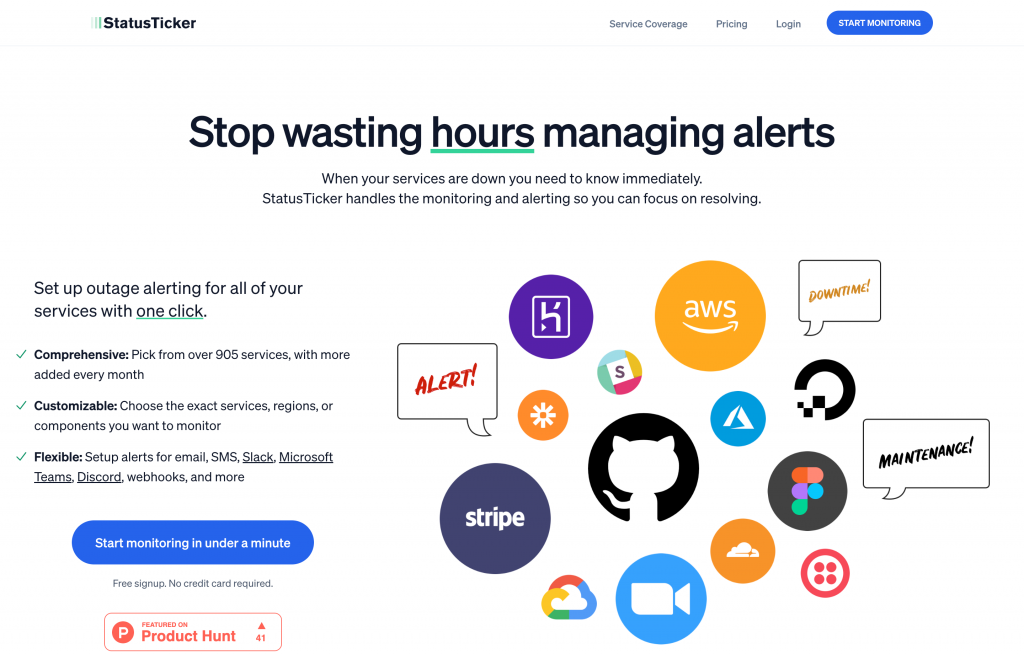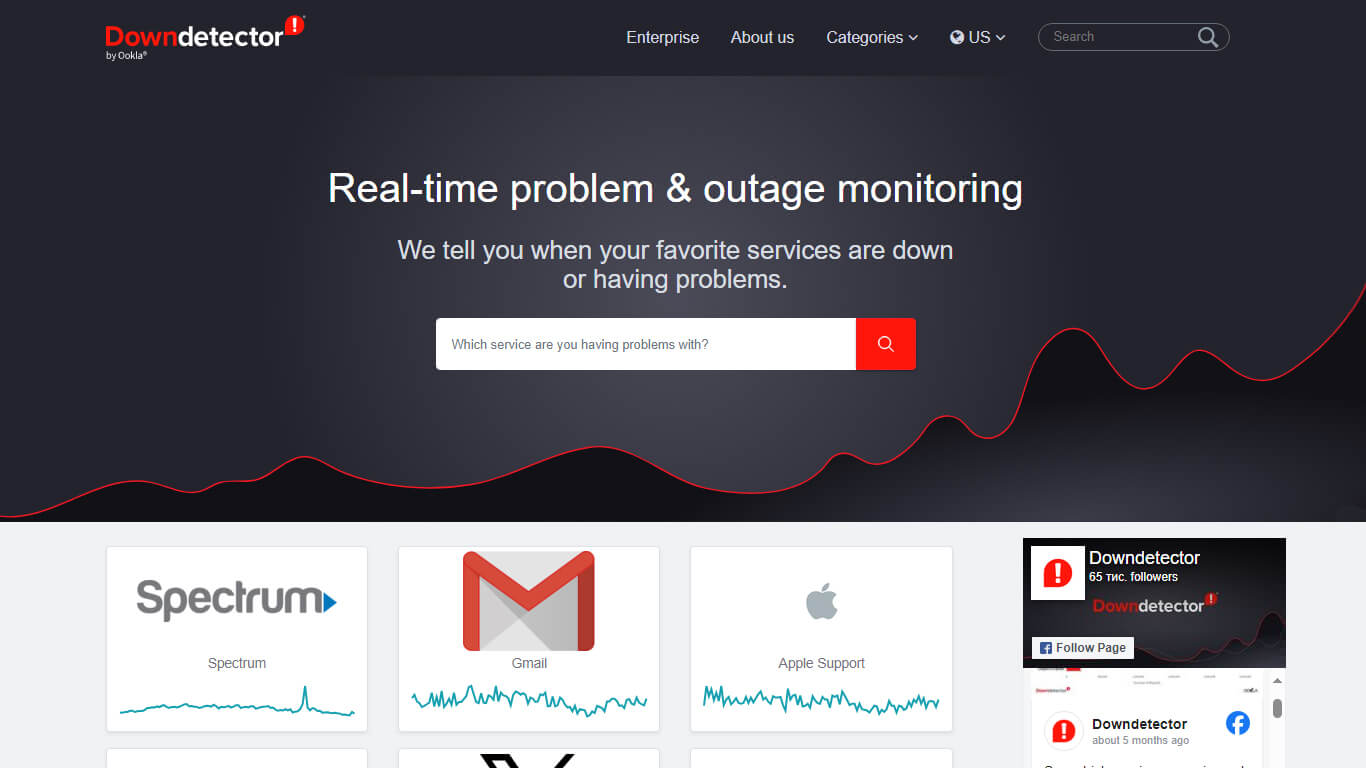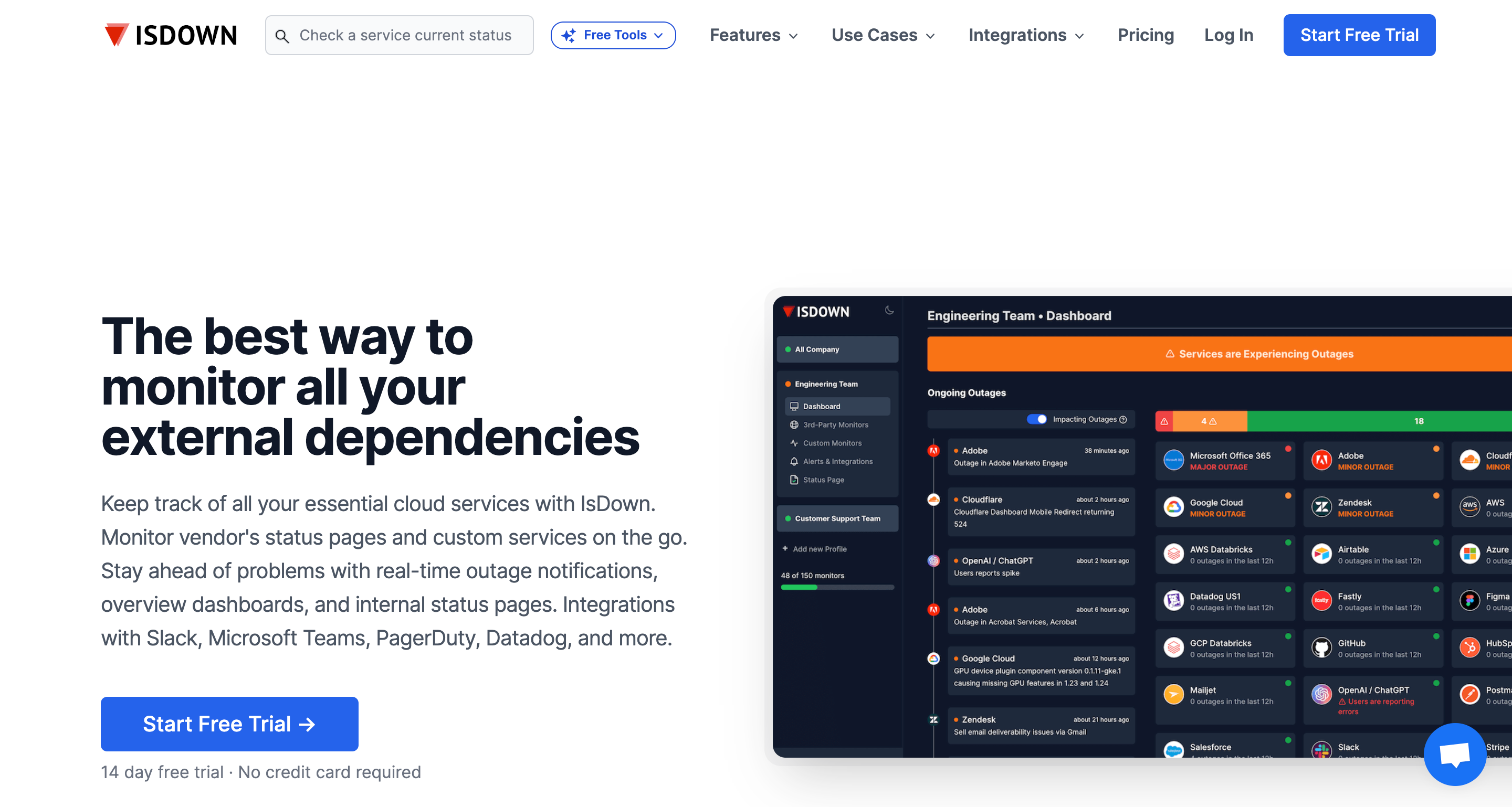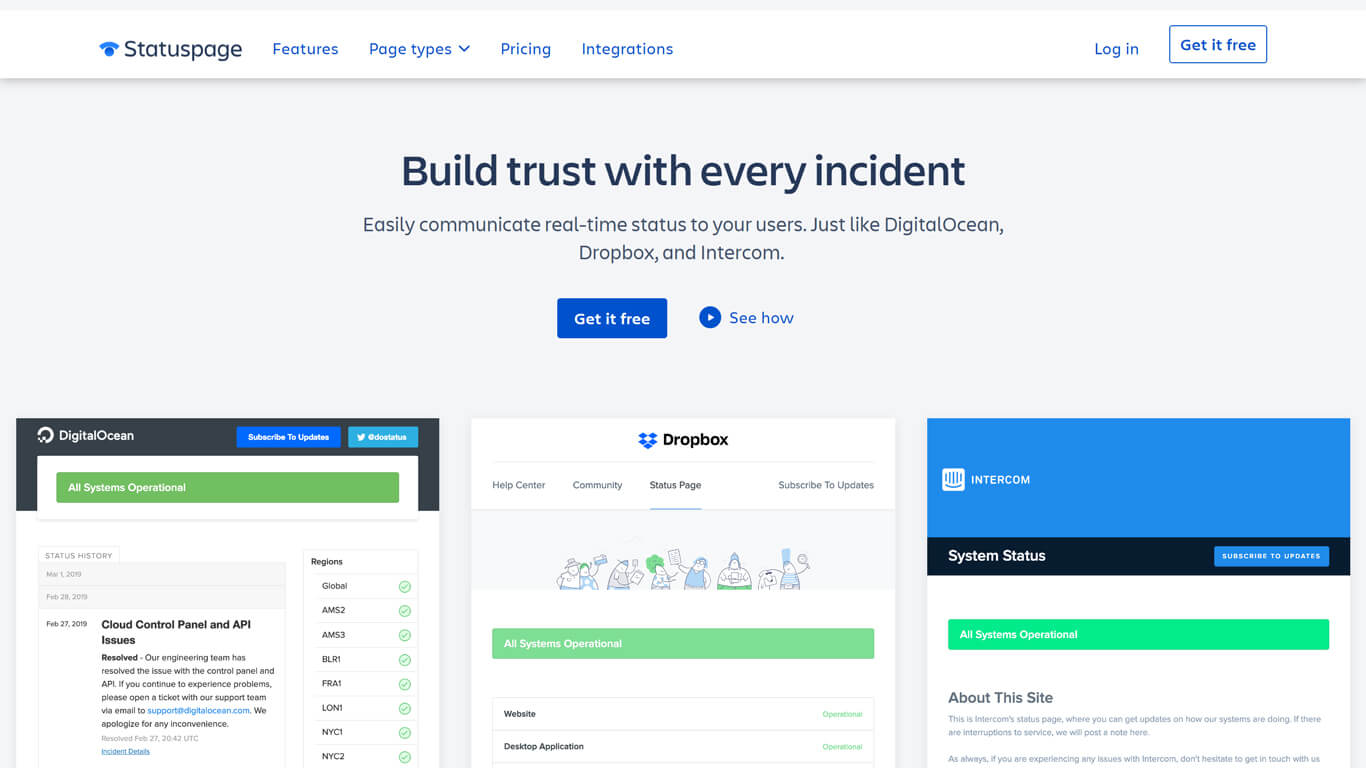
In this realm of cloud and SaaS service uptime, StatusGator offers unparalleled monitoring of nearly 3,000 services. This article delves into the alternatives to StatusGator in 2024, but first, let’s understand what sets StatusGator apart.
Unlike typical status page aggregators, StatusGator offers advanced status aggregation with unique capabilities.
StatusGator collects the status of almost 3,000 services from official, published, status pages to gain as much information as possible. This aggregation is more than just a collection of data. It’s a sophisticated process where StatusGator does the heavy lifting, scraping, and subscribing to APIs from each service you rely on.
StatusGator blows away the competition when it comes to the breadth and depth of status page integrations it supports, covering more than 250 unique status page APIs and formats. It also utilizes advanced AI to properly normalize and classify incidents based on severity – something no other provider offers.
Once the data has been collected, StatusGator goes the extra mile by aggregating the data into a single unified status page.
Some other StatusGator services include:
- Public, private, and audience-specific status pages
- White-label and password-protected pages
- Custom domains and email branding
- Multiple user roles, admin features, and status page Single Sign-On (SSO)
- An upcoming maintenance feed and unlimited notifications
- Access to historical data, reporting tools, and early warning signs
When looking at StatusGator alternatives, it can be hard to find one that’s right for you. StatusGator provides a variety of tools and customization, which many other status aggregator tools don’t. That said, we want you to explore your options properly.
Before we jump into StatusGator alternatives, let’s take a look under the hood of the status page aggregator to understand how it works.

What’s A Status Page Aggregator?
There are three main components behind the status page aggregator: the checker, the normalization of data, and the display.
- The Checker: This is the core of data collection, periodically checking the status of your services in real time and storing the results.
- Data Normalization: This process takes the collected data and transforms it into a format that’s easily understandable for your users.
- Display: It allows users to view the data in a user-friendly format, which could be through messages, integrations with other tools, or a customizable status page that aligns with your brand.
Now that we’ve explored the unique features of StatusGator, let’s dive into the alternatives available in 2023.
StatusTicker as a StatusGator Alternative

StatusTicker is an aggregating tool designed for aggregating and displaying the status of various online services. It is similar to StatusGator as it also provides a unified status page where users can monitor the health and performance of multiple services they depend on.
One key aspect of StatusTicker is that it emphasizes simplicity and customization, aiming to make sure your users can easily understand incident communication. It monitors over 840 services, whereas StatusGator monitors almost 3,000.
While StatusGator is known for its detailed, official updates and is particularly useful for businesses and IT professionals, StatusTicker could be more suited for users who prefer a more straightforward, possibly less detailed, overview of service statuses.
The Limitations
The limitations of StatusTicker as a StatusGator alternative include the absence of an advanced aggregation feature. It pulls data inconsistently and the insights into outages or incidents are limited. As a result, frequent monitoring and updates are needed. StatusTicker can rely on unofficial status data which could be more reliable. Further limitations include:
- Restricted range of services and customization features
- Absence of key functionalities, such as component filtering
- Customer support is often limited, particularly with free plans
Downosaur as a StatusGator Alternative
Previously, Downosaur was a well-regarded StatusGator alternative, with various features and tools available to monitor incident communication.
However, it has since ceased operations, highlighting the potential risks of such services. In contrast, StatusGator’s reliability is proven, having been operational since 2015.
For those who may not possess the expertise or time to find or build a status page aggregator, opting for a reputable and leading service like StatusGator is a good option.
The Limitations
Reliability is a key component to look out for when choosing a status aggregator tool or StatusGator alternative.
Services like Dinasour, which are very similar to StatusGator, but offer fewer features, disappear. So the users have to check the status aggregators again and go over the setting up process once more.
Downdetector as a StatusGator Alternative

The key difference between Downdetector and StatusGator is that they offer different approaches to monitoring the status of online services.
Firstly, Downdetector gathers crowdsourced information from users to provide real-time status overviews. It can be a valuable source for instant outage awareness. However, it may fall short for businesses requiring precise and detailed status information due to its reliance on unofficial user-reported data. This can also cause complications if there is conflicting data between users.
For Downdetector, the status display isn’t the priority. The first thing users see when they look for a service is a form to report any issues with the service.
On the other hand, StatusGator leverages data from official service status pages, presenting a more reliable and detailed perspective of service statuses. StatusGator offers custom status pages and proactive status monitoring. These features by StatusGator are aligning more closely with the structured requirements of business operations.
The Limitations
Downdetector disadvantages compared to StatusGator are primarily based on features that it doesn’t have:
- No website monitoring
- Users as the data source
- No granular detail about the status of the components or regional outages
- Unattractive UX with cluttered status display, ads on the website create additional noise
- Status reporting form as a primary purpose
- Limited notifications for non-subscribers. Downdetector’s basic option is only integrated with Twitter for notifications. Users must otherwise check the website itself or subscribe to receive email alerts
- Expensive plan for enterprises
IsDown.app as a StatusGator Alternative

IsDown.app is a status monitoring tool that allows businesses to track the uptime of various online services.
It brings together the status information from multiple providers, allowing users to assess the health of essential services quickly. IsDown.app offers a straightforward approach to monitoring, which can be appealing for smaller businesses or those with fewer services to track.
StatusGator offers a comprehensive, customizable, and detailed approach to service monitoring. Our variety of pricing plans to meet the requirements of different companies as a robust and detailed monitoring solution
When looking for StatusGator alternatives, it’s important to know that aggregating status pages is a critical task for DevOps, SRE, and IT teams to effectively manage outages. This tool is also advantageous for end users across various businesses and non-profit organizations. We compared IsDown.app vs StatusGator in detail earlier in our blog.
Statuspage.io as a StatusGator Alternative

Statuspage.io is a service that allows businesses to communicate the status of their services on the status page. It’s primarily focused on enabling companies to build and manually manage status pages for their services, fostering direct communication with their customers.
Similar to StatusGator, Statuspage monitors only some third-party vendors. That said, there is little information available regarding this.
StatusGator allows users to create a status page for their services too. But, the initial value of StatusGator is that it aggregates status updates from multiple external services, providing a single status page for monitoring various third-party service statuses. Additionally, there is much more information available regarding third-party monitoring. While Statuspage.io is ideal for businesses looking to maintain their service status communication, StatusGator serves those who need to monitor a wide array of cloud services and SaaS companies on top of their own service. This makes it a valuable tool for IT professionals, K12 schools, DevOps, and businesses reliant on multiple cloud services.
DIY Solutions as an Alternative to StatusGator
A less typical approach to incident monitoring. If you choose to aggregate status pages yourself, there are a few things you should consider.
Firstly, you’ll need to choose a central location for your status page as the display element. This could be a simple webpage that you host on your server.
After this, you have to implement the checker. To gain status information, you will need to access every status page relevant to your organization and subscribe to updates for each of them individually.
Often, the problem here is that some pages don’t allow subscriptions. In this case, you’ll have to write a script that scrapes data from status pages, and reverse-engineer APIs. It’s not the easiest thing to do, and it can result in inaccurate or limited data and takes a lot of work to maintain.
The Limitations
Primarily, DIY status pages are limited in that they take time. Whilst they have their advantages such as being low cost and flexible, they take lots of time to set up and configure, and may not be as reliable as paid solutions. If something goes wrong, there is a lack of support available. It also requires regular and manual monitoring to establish status information.
If you have the time and expertise to set up and maintain a DIY solution, it can be a great option for keeping your users informed of any emerging issues. It can also be a fun and rewarding task if you have enough time. However, if you’re not experienced with coding or website development, a pre-made solution makes a lot more sense.
Summary of the StatusGator Alternatives
Overall, some StatusGator alternatives might be cheaper than StatusGator itself, but many are not reliable. Some, such as Downosaur, have proved this point. Others have their drawbacks, and even making one yourself has its limitations.
In short, many StatusGator alternatives are rarely reliable for businesses that depend on numerous cloud services. Additionally, it is unlikely that they monitor the number of services StatusGator does (almost 3,000), or offer the same level of customization and a neat display.
If you wish to make your status aggregator tool over choosing a StatusGator alternative, consider if you have the technical expertise and time to ensure that your aggregator remains accurate and reliable over time.
If this seems challenging, opting for a dedicated service like StatusGator, known for its robustness and comprehensive features, could be a more beneficial choice.

FAQ
Q: What are the alternatives to StatusGator?
There are some StatusGator alternatives available, such as DIY alternatives, Downdetector and StatusTicker. However, they all lack features or have limitations when compared to StatusGator.
Q: Is it worth looking for a StatusGator alternative?
If the price of StatusGator is too much for you, then it might be worth finding a cheaper tool if your organization’s incident monitoring requirements are basic. That said, StatusGator also offers a basic, free version, which might be worth opting for first.
Q: How can I make a StatusGator alternative on my own?
To do a DIY StatusGator alternative, you should first consider if you have the technical expertise and time to ensure that your aggregator remains accurate and reliable over time. If you are keen to try it out and have the time to do so, refer to our article here.
Q: Are there cheap alternatives to StatusGator?
Yes, some are free or very low cost. However, they are not as reliable as StatusGator.
Q: What are the limitations of StatusGator alternatives?
Many are less functional or lack certain features that StatusGator includes. Additionally, the number of services they monitor can be limited, as StatusGator monitors nearly 3000 services (including third-party).
Q: How do StatusGator alternatives ensure status accuracy?
They don’t, many rely on unofficial status data, user reports, or out-of-date status data.
Q: Can I customize alerts and notifications with StatusGator alternatives?
You can, depending on the alternative, but not to the same extent as StatusGator.



